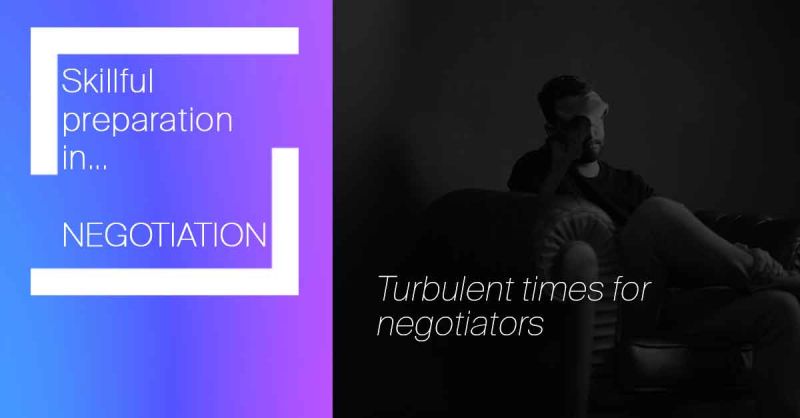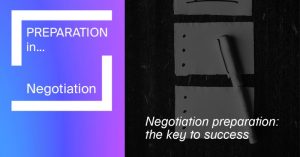
It’s boom-time for remote working technology, some online shopping and logistics businesses. For others, the financial press every day reports a new company failure that may well be the result of poor negotiating.
Often these failures are due to the negotiators’ panicked focus on the negotiation substance; commonly losses that are looming large. This worry over losses overrides their attention to ‘how’ they are conducting the negotiation – their behavioural ‘Process’.
Also lacking is an appreciation that negotiations over allocating losses draw on different skills compared to negotiations over building benefits.
Downturn v. Upturn: Each Requires a Different Negotiating Approach
One important area of ‘Process’ management is to appreciate how to frame the negotiation. Psychologically, we have an irrational tendency to be more willing to gamble with losses than with profits (Prospect Theory). So, a negotiation in an economic downturn dealing with broken contracts, failed deals, mounting debt, threatened lawsuits and damaged reputations is highly likely to be undertaken in a negative frame.
Working with a negative mindset and a willingness to undertake more risk leads to less effective negotiating. Negotiators focus too much on what they are losing, do not think clearly about the other side’s position, become more competitive, even vitriolic, in style, and move into using win/lose tactical maneuvers. The counter party responds in kind.
Failing to Prepare is Preparing to Fail
If unchecked, its little wonder that these behaviours lead people to negotiating inferior outcomes. One interesting test for recognizing if negotiators have achieved a poor result is to note if a team member rationalizes: ‘Well, we did the best we could in the circumstances.’ Is this code for admitting failure?
As always, careful systematic preparation is the key to success.
Tips for Negotiating in Turbulent Times
Undertaking negotiations in economic downturns, often re-negotiations that you do not want to undertake, requires even more skillful preparation. Here are some suggestions:
First, from the outset, work hard at reframing the (re)negotiation from a negative to a positive mindset. This requires carefully building up an appropriate negotiation ‘atmosphere’ so that all parties can see the potential deal as a gain.
Second, carefully monitor yourself to check the tendency that leads negotiators in loss situations to gamble and take more risk.
Third, when (re)negotiating disappointing results where egos are being damaged, plan how you will avoid being caught up in the tactical ‘blame games’.
Fourth, look even more deeply for those unspoken needs of the other party. The key for influencing the other lies in understanding these ‘hidden agendas’.
Fifth, anticipate and prepare for how you will manage more competitive, hard-line behaviours. As negative events emotionally impact on us more strongly than positive events, parties are more likely to act aggressively and be unwilling to accept compromise.
Sixth, read the tips for negotiating from a low power base in our previous article.
Seventh, consider the value of involving a third-party expert in your negotiation preparation to help objectively balance out potentially less effective approaches.
Finally, remember that hope is not a negotiating strategy.
To discuss this article in more depth or to explore our negotiation skills training further please contact us on +612 9299 9688.



